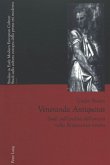What explains the similarity among the conversion accounts of so many "barbarian" rulers of the Byzantine Near East? Royal adoptions of a new religion, whether Christianity, Judaism, or Manichaeism, appear to draw on a common literary topos. King Abgar of Edessa's conversion became the subject of several early Christian legends. This analytical comparison of various conversion accounts argues that they played a significant role in fashioning the diverse local ethnic groups in the Near East into "Romans". The Abgar legend formed part of a larger literary movement which disseminated often similar accounts of royal conversion within and beyond the borders of the Empire. The conversion stories contain both received and invented traditions which reveal popular and common cultural patron-client patterns. Significantly, various ethnic groups translated these general themes to their unique circumstances. Mirkovic's examination of this tangled web of ethnicity, religion, culture, and politics in the fourth century reveals the historical and literary significance of these legends.
Bitte wählen Sie Ihr Anliegen aus.
Rechnungen
Retourenschein anfordern
Bestellstatus
Storno








